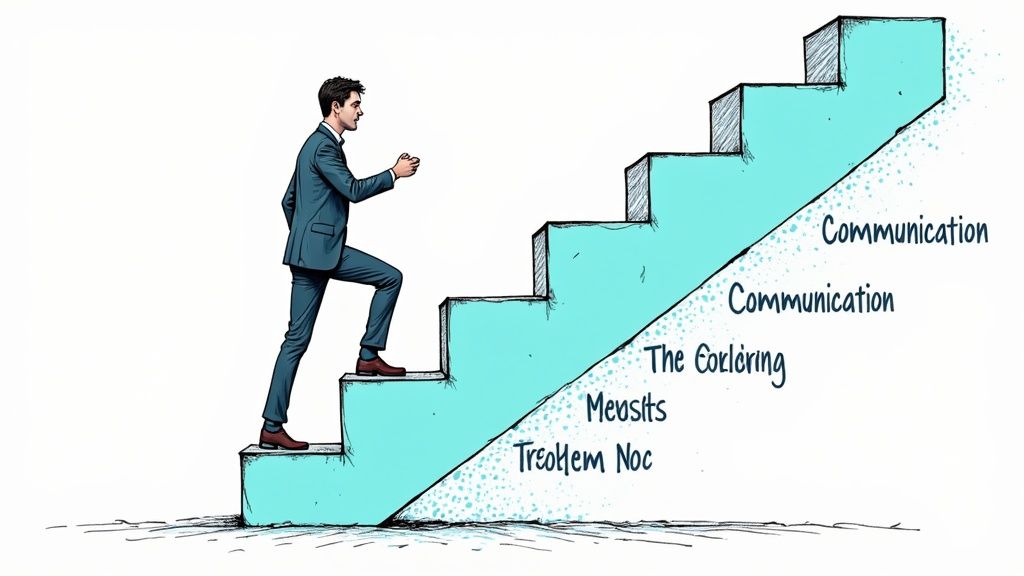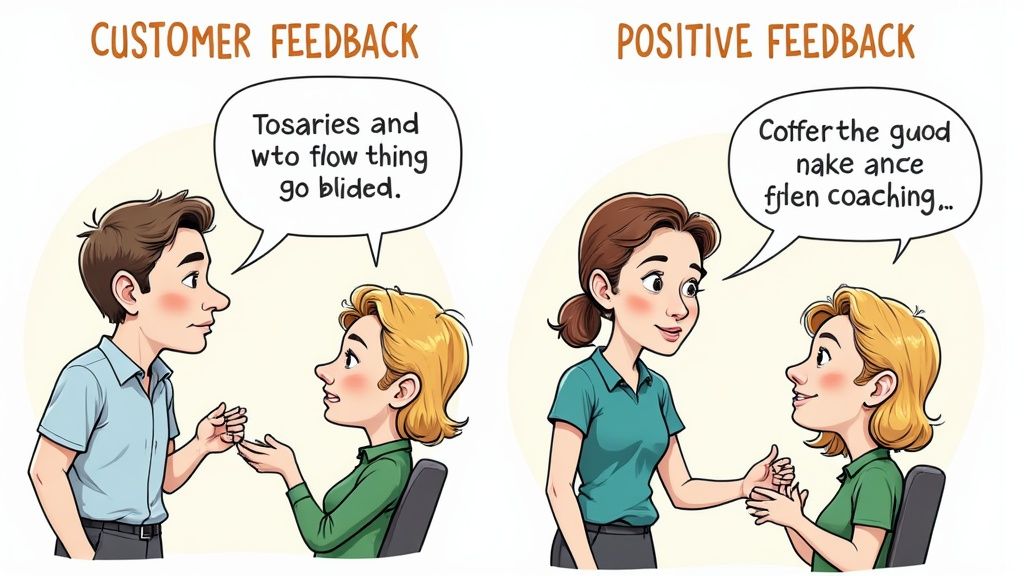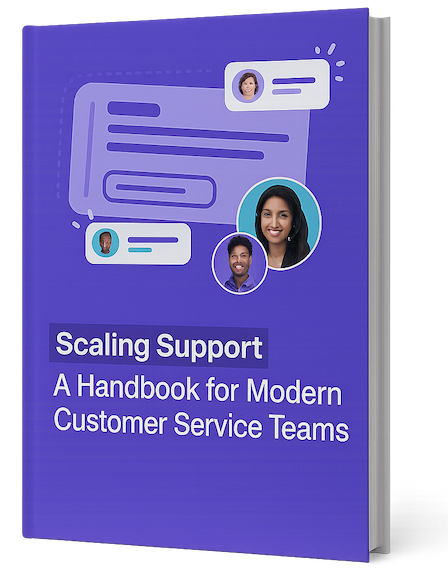When it comes to customer service excellence, coaching goes far beyond basic training sessions. It’s about making a deliberate investment in your team’s growth and success. Great coaching creates an environment where agents can develop their skills, build confidence, and deliver outstanding service. But many companies struggle to implement coaching effectively. Let’s explore what successful coaching looks like and the concrete results it can deliver.
Why Traditional Approaches Fall Short
Most traditional customer service training relies heavily on scripts and standard procedures. While these provide a foundation, they often miss the human element that’s crucial for meaningful customer interactions. For instance, when an agent faces an unusual technical problem, having only basic troubleshooting steps isn’t enough – they need the judgment and confidence to think creatively and find solutions. Without ongoing coaching and feedback, agents can feel stuck and unsupported, leading to inconsistent service quality and increased frustration. This directly impacts both customer experience and employee retention.
The Power of Modern Coaching Frameworks
Today’s most effective coaching approaches focus on personalized development and building essential interpersonal skills like empathy and active listening. The numbers speak for themselves – 83% of high-performing service agents report receiving adequate training, compared to just 52% of underperformers. This stark difference shows how proper coaching directly connects to agent success. When companies provide their teams with targeted support and development opportunities, it creates a more capable and engaged workforce. The result? Happier customers, stronger loyalty, and better business outcomes.
Measurable Results: From Profitability to Performance
The benefits of strategic coaching show up clearly in the data. Companies that prioritize employee development through coaching programs see an 11% boost in profitability. Teams receiving structured coaching show a 31% improvement in performance metrics. These aren’t just impressive statistics – they represent real business value. Good coaching helps agents handle interactions more effectively, resolve issues faster, and create better customer experiences. When you invest in developing your team’s capabilities, you’re directly investing in your company’s growth.
Real-World Transformations: Turning Struggling Teams into Powerhouses
The impact of effective coaching plays out in real examples across industries. After implementing a focused coaching program centered on empathy and listening skills, one company saw their customer satisfaction scores jump 20% while reducing call handling times by 15%. These improvements came from helping agents better understand and connect with customers’ needs. When organizations build coaching around human interaction skills, it creates positive changes for both employees and customers. With these foundations in place, let’s look at how to build a coaching framework that drives lasting results.
Building Your Coaching Framework That Works
A well-designed coaching system can transform how your customer service team performs. Rather than just providing scripts and procedures, effective coaching creates lasting behavioral changes that help agents excel in every interaction. Let’s explore proven methods for structuring coaching programs that produce real results.
Assessing Team Needs and Defining Clear Objectives
Start by taking a close look at your team’s current performance. What are their strengths? Where do they need help? For instance, an agent might have deep product knowledge but struggle with communication skills. Regular performance reviews, conducted quarterly or twice yearly, help track progress and adjust coaching as needed. Specific goals are essential – identify which skills need development and what metrics you want to improve. Having concrete targets guides your coaching efforts and makes it easier to measure success.
Designing Targeted Interventions and Personalized Development Plans
Just as each customer interaction is unique, every agent learns and develops differently. The most effective coaching accounts for individual needs and learning styles. An agent who takes too long on calls may need practice with efficient problem-solving, while another might benefit from conflict resolution training. Like getting clothing altered to fit perfectly, personalized coaching plans address specific areas for improvement to maximize each agent’s growth potential.
Incorporating Empathy and Emotional Intelligence
Research shows that training focused on empathy and emotional intelligence produces better results than traditional approaches. Agents who develop these skills are nearly twice as likely to become top performers. Role-playing exercises and feedback sessions help agents build emotional awareness, establish rapport with customers, and handle difficult situations with grace. These soft skills become especially valuable when dealing with complex or emotionally charged interactions.
Creating Sustainable Coaching Practices and Fostering a Culture of Feedback
For coaching to truly make an impact, it needs to become part of your team’s daily operations. This means establishing consistent practices that get reinforced over time through regular check-ins and feedback sessions. Create opportunities for agents to reflect on their performance, receive constructive input, and continuously improve. Build an environment where team members feel comfortable sharing challenges and celebrating wins. By making coaching an ongoing priority rather than a one-time event, you empower your team to consistently deliver excellent customer experiences that drive loyalty and business growth.
Using Technology in Support Team Coaching

Success in customer service coaching relies on using the right tools alongside human connection and expertise. Smart technology enables data-driven coaching while keeping personalization and the human element at the core of agent development.
The Impact of Technology on Support Team Coaching
With hundreds or thousands of customer conversations happening daily, manually reviewing them all would be impractical. Technology helps coaches quickly spot key moments for improvement in agent interactions. AI tools can analyze calls to identify both successes and struggles, pinpointing exactly where agents need extra guidance. This focused approach lets coaches make the best use of their time with each agent.
Supporting Agents Through Real-Time Tools
Modern coaching platforms provide agents with instant guidance during live customer conversations. These tools suggest relevant knowledge articles, flag compliance issues, and offer coaching prompts when needed. Having this support system helps agents learn faster while preventing mistakes. New team members especially benefit from having real-time assistance as they build confidence in their role.
Data-Informed Coaching With Analytics
Hard data forms the foundation for effective coaching. Analytics tools track vital metrics like handle time, first-contact resolution, and customer ratings. This information shows coaches exactly where each agent excels or needs help. For example, if data reveals an agent consistently struggles with technical troubleshooting, the coach can focus training specifically on those skills.
Making Technology Work For Your Team
While technology brings clear benefits to coaching, successful implementation takes careful planning. When selecting tools, consider your specific needs, budget constraints, and team’s technical comfort level. Start with small pilot programs to test new technology and gather team feedback before full rollout. Remember that technology works best as a complement to human coaching – not a replacement.
One practical example is SupportMan, which connects Intercom ratings to Slack. This integration enables immediate discussion of customer feedback, helping teams learn from both positive and negative interactions. Rather than just collecting data, it sparks conversations that drive real improvements. The steady flow of customer insights helps shape coaching priorities and reinforces the value of feedback in delivering great service. Focus on tools that boost your team’s capabilities while maintaining the personal connections that make coaching effective.
Measuring What Actually Matters in Coaching
A successful customer service coaching program needs more than just training sessions. You need clear insight into what drives real improvement and results. By focusing on meaningful metrics rather than surface-level numbers, you can optimize your coaching efforts and prove the value of investing in your team’s growth.
Beyond Vanity Metrics: Identifying Key Performance Indicators
While tracking the number of coaching sessions sounds good on paper, it doesn’t tell you if your coaching actually helps customers. Focus instead on metrics that directly connect to customer experience and business results. Track indicators like first-call resolution rate, customer satisfaction (CSAT) scores, and handle time. These numbers show you how well agents apply their coaching skills to help customers efficiently and effectively.
You should also gather qualitative feedback from your agents through surveys and one-on-one conversations. Ask them how coaching impacts their confidence, job satisfaction, and ability to handle tough customer situations. Their direct input gives you deeper understanding beyond just the raw performance numbers. This combination of metrics and agent perspectives shows the full picture of how coaching drives improvement.
Building a Data-Driven Coaching Framework
To track progress effectively, start by setting clear baseline metrics before you begin coaching. This gives you a concrete starting point to measure growth and show results. For example, if your baseline CSAT score is 70%, set a target to reach 80% after implementing coaching for a set time period.
But don’t just collect numbers – use them to adjust your coaching approach. If the data shows agents consistently struggle with technical troubleshooting, focus your coaching there. Like a doctor using test results to prescribe treatment, let the data guide where you concentrate your coaching efforts for maximum impact on performance and customer happiness.
Practical Methods for Tracking Progress and Gathering Feedback
You can use several methods to track progress and get feedback to refine your coaching program. Set up regular performance reviews with specific measurable goals tied to coaching objectives. This creates accountability while giving opportunities for personalized feedback. Add real-time coaching tools like in-call guidance and post-interaction reviews to provide immediate support when agents need it.
Take advantage of technology to simplify data collection and analysis. Most customer service platforms include analytics dashboards that show agent performance and customer interaction trends. This helps you spot patterns, identify areas for improvement, and adjust coaching to match your team’s needs. By looking at both numbers and agent feedback, you’ll understand exactly how coaching impacts your team and can keep improving your approach to build excellent customer service skills.
Creating Coaching That Drives Team Retention

Well-designed customer service coaching is a key factor in keeping your best team members around longer. By investing in agent growth and development, companies can build more satisfied teams and reduce expensive turnover costs. Let’s explore how successful organizations use coaching to create the kind of work environment that makes people want to stay.
Building Career Paths Through Coaching
The best way to keep valuable team members is to show them where they can grow within your company. Good coaching helps spot agents who could become great leaders and gives them the skills to move into management roles. This creates clear paths forward and motivates agents to build their careers with you. You can also use coaching to help agents develop specialized abilities in areas like technical support or complex problem-solving. As agents gain expertise, they become more valuable to the organization and can earn more over time.
Boosting Engagement and Job Satisfaction With Coaching
Customer service work comes with daily challenges and stress. Regular, supportive coaching makes a real difference in how satisfied agents feel in their roles. When people know they have backup and guidance, they naturally become more engaged. Setting up consistent feedback and personalized growth plans proves to agents that you’re invested in their success. This leads directly to better morale and team spirit. For example, coaching focused on handling tough customer conversations with empathy helps agents stay calmer under pressure and feel more confident in their abilities.
Reducing Turnover Through Strategic Coaching Programs
High turnover is an expensive problem in customer service, with major costs for recruiting and training new hires. Research shows that companies who prioritize coaching see much lower turnover rates. By addressing core issues through coaching – like limited growth opportunities or skill gaps – you tackle the reasons people leave. Teams with clear advancement paths and strong development support tend to keep their people longer. Beyond that, creating an environment of continuous learning through coaching makes the work itself more engaging.
Real-World Examples of Retention-Focused Coaching
Many companies have succeeded with coaching programs designed specifically to improve retention. One organization cut agent turnover by 20% after starting a mentorship program paired with individual coaching. Their program connected newer agents with experienced team members who could offer guidance while building community. Another company created a “growth framework” that mapped out specific career advancement steps within customer service. By giving agents clear goals to work toward, they saw a notable increase in people choosing to stay. These examples show how focusing on coaching can help you build and keep a stronger, more stable team for the long run.
Preparing Your Coaching Program for Tomorrow

As customers’ needs evolve and new technologies emerge, customer service coaching programs must adapt to stay relevant. Organizations have to prepare their support teams not just for today’s challenges, but also for what’s coming next. Here’s how to create a coaching program that helps your team thrive now and in the future.
Embracing Change: Building Adaptable Coaching Programs
Strong coaching programs stay flexible and evolve alongside shifting customer needs. For instance, as more customers reach out through social media messaging, coaches need to help agents master these new channels. The same goes for AI tools – as they become more common in customer service, coaching should cover how to work effectively with this technology. Programs that stay static quickly lose their value, while those that adapt help teams stay ahead of trends.
Developing Resilience: Equipping Teams for Dynamic Environments
Today’s support teams face constant changes and unexpected challenges. That’s why building resilient teams is crucial. Good coaching develops key skills like problem-solving, adaptability, and emotional intelligence. Practice scenarios that simulate tough customer interactions give agents hands-on experience handling difficult situations calmly and professionally. This proactive approach helps teams maintain quality service even when facing new challenges.
Implementing Future-Focused Strategies: Practical Steps and Success Indicators
To create a coaching program ready for tomorrow, you need concrete strategies that look ahead. Consider these key steps:
- Trend Analysis: Keep tabs on industry changes and customer feedback to spot emerging needs early
- Skills Gap Assessment: Figure out what skills your team will need down the road and build training around those areas
- Technology Integration: Test and add helpful new tools like coaching platforms or training simulations
- Feedback Loops: Get regular input from agents to keep programs useful and current
Track success through metrics like customer satisfaction scores and agent retention, but don’t forget qualitative feedback. How confident do agents feel about handling future challenges? Their perspective matters just as much as the numbers.
Focusing on Human Connection in a Tech-Driven World
While tools like ChatGPT and automated systems play bigger roles in customer service, human skills remain essential. Customers still want genuine empathy and personalized care. That’s why coaching must continue developing interpersonal abilities like active listening, clear communication, and emotional intelligence. This human-focused approach helps teams build real connections with customers, leading to stronger loyalty and business growth. By balancing people skills with technical knowledge, your coaching program sets teams up for lasting success.
Ready to empower your support team with real-time coaching and feedback? Try SupportMan, the tool that seamlessly integrates Intercom ratings with Slack, enabling continuous improvement and driving customer satisfaction. Start your free trial today: https://supportman.io


